The Daily Bulletin is published by Internal and Leadership Communications, part of University Communications
Contact us at bulletin@uwaterloo.ca
Submission guidelines
Editor:
Brandon Sweet
University Communications
bulletin@uwaterloo.ca
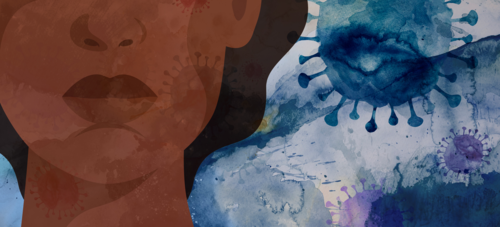
The first in a three-part series of virtual events exploring various topics related to COVID-19 begins Friday, April 23 from 1:00 p.m. to 3:00 p.m.
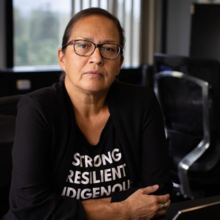 The first event “Disparities, Inequities, and Inequalities” will highlight the ways in which members of Indigenous and racialized communities have been disproportionately impacted by the virus. A collaboration of the President’s Anti-Racism Taskforce (PART) and the Office of Research, the event includes a keynote, panel session, and Q&A.
The first event “Disparities, Inequities, and Inequalities” will highlight the ways in which members of Indigenous and racialized communities have been disproportionately impacted by the virus. A collaboration of the President’s Anti-Racism Taskforce (PART) and the Office of Research, the event includes a keynote, panel session, and Q&A.
The keynote features Dr. Cornelia Wieman, physician (psychiatrist) with the First Nations Health Authority in British Columbia.
The panel, moderated by Trevor Charles, a University of Waterloo biology professor, includes:
Please visit the A Year of COVID-19 page to register for one or more events in the series and for more information about the speakers and their presentations.
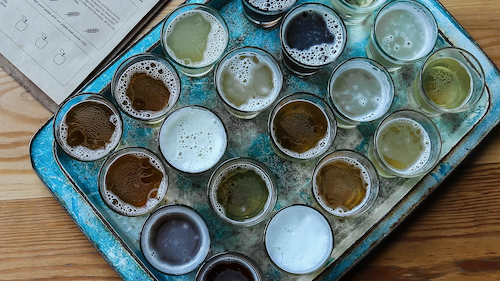
A message from the Office of Advancement.
Which Waterloo program would you recommend to become a beer entrepreneur? For Chris Goddard (BA ’01), studying theatre was surprisingly helpful: “My degree not only trained me to be an actor, but also to be a good listener, to be adaptive in different situations, to think quickly on my feet and to be willing to take risks. These great stills for the stage, and they are tremendously useful in the business world.”
Chris is the co-founder of Craft Brand Co., a Toronto agency that partners with brewers to offer renowned beverages to Ontario beer lovers. Their online store, Bodega, offers limited release brews, exclusive offerings and all the classics – and delivers across Ontario. This spring, Chris and his colleagues partnered with Waterloo to create our second Alumni Happy Hour Box.
Crack open a cold one and bring it to your balcony, yard, patio—wherever you can enjoy the weather. The Happy Hour Box has everything you need to keep your beverages cold, your thirst quenched and your Warrior spirit alive! Alumni can order their box today, and Chris’s team will ship it in time to celebrate Alumni Weekend 2021.
Learn more about Chris’s entrepreneurial journey

This article was originally featured on the Athletics and Recreation website.
The Department of Athletics and Recreation is proud to celebrate National Volunteer Week from April 18-24. Volunteers are a critical part of the everyday operations of the department and although volunteering has looked a little different throughout the pandemic, the thankless act of each volunteer has not been overlooked.
Volunteering has become a very prominent way of positively impacting our attitudes and behaviours throughout the pandemic including many student volunteers who have given back through the Move Your Mind program, reminding students to take care of their mental and physical health.
Other areas within the department that saw volunteers become key contributors this past year included: Advancement, Clubs, Marketing and Outreach (Team-Up, Rise-Up), Strength and Conditioning, and Athletic Therapy. Over 300 volunteers gave back to the Warriors community in these areas mentioned throughout 2020.
"We are incredibly fortunate to have so many outstanding student, alumni, and community volunteers who generously gave their time to further advance our department," said Roly Webster, director of athletics and recreation. "I am especially proud of our volunteers who showed just how selfless our Warriors community can be even during a pandemic. It is very encouraging and inspiring to see."
The magic of volunteering is that it creates social and economic value for all and we are seeing how prevalent that is in our current environment. The department is very fortunate to have the support of alumni and community volunteers lending their time and talent to support our student population.
"Volunteering is a two-way street and we hope the contributions and impact are rewarding and mutually beneficial," mentioned Webster. "We are truly thankful for all the volunteers who were so generous this past year and the ongoing effort of those graciously giving their time during the pandemic."
Throughout the week, the department will be thanking volunteers on social media for their selfless contributions.
Check out the National Volunteer Week profiles.
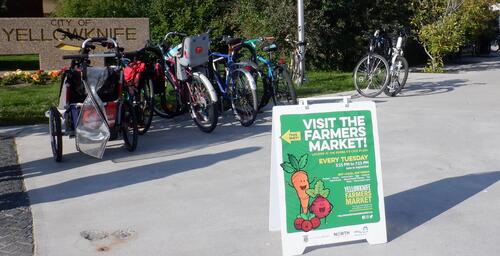
New research is shining light on the importance of farmers' markets’ ability to mitigate potential disruptions to distribution networks in the face of system shocks like the COVID-19 pandemic.
In a recent study, the researchers found the markets’ regional characteristics play a key role in the decision to move all or parts of their operations online — and how that decision can help or hinder its surrounding community.
“By building online communities through their social media and website tools, farmers’ markets can play a role in keeping the community connected and supporting a sustainable and just food system through the pandemic and beyond,” said researcher Josalyn Radcliffe, a PhD student in Waterloo’s School of Public Health and Health Systems.
“The decision to transition online must always be anchored in the unique context of the organization.”
That is why many southern farmers’ markets across Canada were able to go online during the pandemic, but many in the North opted to stay in-person. The Yellowknife Farmers Market was one such case, choosing to pursue an adapted outdoor market, albeit with a “Shop, Don’t Stop” message that fits with the emphasis on community expressed by patrons and the event-like atmosphere valued by many.
“While areas south of Yellowknife have more capacity to grow food, challenges regarding equitable access to electricity and internet and the potential for disruption in food access are common issues to markets in the Northwest Territories,” said Kelly Skinner, a professor in the School of Public Health and Health Systems.
“Still, online spaces may be a valuable tool to mitigate potential disruptions to distribution networks due to the impacts of climate change and help facilitate the growth of the local food sector in the North.”
Skinner collaborated with other researchers at Waterloo, Wilfrid Laurier University and the Yellowknife Farmers Market on a study of the market, which typically runs from June to September and attracts hundreds of people per week.
They conducted surveys during the 2019 market season, offering both a short flipchart dot survey, completed by 59 patrons and a longer questionnaire, completed by 31 patrons. A vendor survey was postponed due to COVID-19.
The results of the two patron surveys showed that this farmers’ market was distinct: 58 per cent of Yellowknife consumers came to eat dinner, enjoy the atmosphere and support local businesses. At other markets across Canada, only two per cent attend primarily for the dining options, prioritizing instead the purchase of fresh and local foods. Most patrons at the Yellowknife market attended as couples and spent more than half their time talking to others.
The study also noted that online farmers’ markets can be great opportunities to complement in-person relationships, share knowledge and maintain connections.
The study, Virtual barriers: unpacking the sustainability implications of online food spaces and the Yellowknife Farmers Market’s response to COVID-19, was published in Nutrition Journal. It was co-authored by Waterloo researchers Radcliffe, Skinner and Professor Warren Dodd, Wilfrid Laurier University’s Andrew Spring, Yellowknife grower France Benoit and Yellowknife Farmers Market’s Lise Picard.
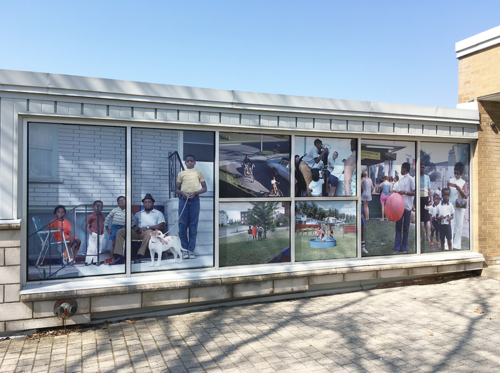
An art installation has taken over East Campus Hall thanks to the efforts of the University of Waterloo Art Gallery (UWAG) and Waterloo PhD candidate and local artist Aaron Francis.
Tamarack Drive is a series of images from 1969 taken by Jamaican-born, Waterloo-based photographer Roy Francis. Originally captured on Kodak Ektachrome 35mm transparency film and developed by Roy at the family home on Tamarack, the series offers a candid glimpse of early Caribbean-Canadian life in Waterloo Region. Curated by Roy’s grandson Aaron, whose grandmother, mother, and uncles appear here alongside one another outside the family home and on family trips to Niagara Falls and the Canadian National Exhibition.
Installed as a series of six oversize window graphics located on the street-facing side of East Campus Hall, 263 Phillip Street is a 25-minute walk from the Tamarack Drive neighbourhood where many of the images where taken. The window takeover expands the public presence of the gallery during lockdown while importantly providing a new context for the work Aaron presents on Instagram under the hashtag Vintage Black Canada™. In curating his family’s archive of photography and slides he proudly represents a Caribbean-Canadian community that has traditionally been underrepresented in Waterloo, while connecting with the broader African diaspora across Canada.
Aaron T. Francis is a doctoral student at the Balsillie School of International Affairs, a multidisciplinary artist, and a curator. The former chair of the City of Kitchener’s Arts and Culture Advisory Committee, Aaron has exhibited works from his Vintage Black Canada™ initiative at the BAND Gallery Toronto, the Gladstone Hotel, the Contact Photography Festival, the Centre for International Governance Innovation (CIGI) as well as with Ryerson University’s Fashion and Race Database.
The University of Waterloo Art Gallery acknowledges the generous support of the Region of Waterloo Art Fund. Special thanks to Jean Stevenson and Westmount Signs.
Campus Wellness locations will be closed today from 8:30 a.m. to 11:30 a.m. due to an all-staff meeting.
60 years ago: The Bay of Pigs invasion
Students can visit the Student Success Office online for supports including academic development, international student resources, leadership development, exchange and study abroad, and opportunities to get involved.
Instructors can visit the Keep Learning website to get support on adapting their teaching and learning plans for an online environment.
Course templates are available within your course in LEARN to help you build and edit your content and assignment pages quickly.
The following workshops, webinars, and events are offered by the KL team (CTE, CEL, ITMS, LIB):
Employees can access resources to help them work remotely, including managing University records and privacy of personal information. Here are some tips for staying healthy while working from home.
Stay informed about COVID cases on campus by consulting the COVID case tracker.
Whether you’re a student or faculty member, the Writing and Communication Centre has virtual services and programs to help you with all of your academic writing needs. This term we have added evening and weekend one-to-one appointments with our peer tutors, and our NEW one-to-one workshops, where you can learn the content directly from one of our writing advisors.
Co-op students can get help finding a job and find supports to successfully work remotely, develop new skills, access wellness and career information, and contact a co-op or career advisor.
The Centre for Career Action assists undergraduates, graduate students, postdocs, staff, faculty, and alumni through navigating career services that are right for them. You can attend a one-on-one appointment or same day drop-in session at the CCA for assistance with cover letter writing, career planning and much more. You can also book an appointment online or visit our Live Chat to connect with our Client Support Team. The CCA is here to help you.
If you feel overwhelmed or anxious and need to talk to somebody, please contact the University’s Campus Wellness services, either Health Services or Counselling Services. You can also contact the University's Centre for Mental Health Research and Treatment. Good2Talk is a post-secondary student helpline available to all students.
The Library has published a resource guide on how to avoid information overload.
The Faculty Association of the University of Waterloo (FAUW) continues to advocate for its members. Check out the FAUW blog for more information.
The University of Waterloo Staff Association (UWSA) continues to advocate for its members. Check out the UWSA blog for more information.
The Indigenous Initiatives Office is a central hub that provides guidance, support, and resources to all Indigenous and non-Indigenous campus community members and oversees the university Indigenization strategy.
The Waterloo Indigenous Student Centre, based at St. Paul’s University College, provides support and resources for Indigenous students, and educational outreach programs for the broader community, including lectures, and events.
WUSA supports for students:
Peer support (Visit https://wusa.ca/peersupport to book an appointment):
Bike Centre – Will be reopening soon.
Campus Response Team, ICSN, Off Campus Community and Co-op Connection all available online. Check https://wusa.ca for more details.
Food Support Service food hampers are currently available from the Turnkey Desk on weekdays from 7:30 a.m. to 7:00 p.m. in the Student Life Centre. If you have any questions please email us at foodsupport@wusa.ca.
Centre for Academic Policy Support - CAPS is here to assist Waterloo undergraduates throughout their experience in navigating academic policy in the instances of filing petitions, grievances and appeals. Please contact them at caps@wusa.ca. More information is available.
WUSA Commissioners who can help in a variety of areas that students may be experiencing during this time:
WUSA Student Legal Protection Program - Seeking legal counsel can be intimidating, especially if it’s your first time facing a legal issue. The legal assistance helpline provides quick access to legal advice in any area of law, including criminal. Just call 1-833-202-4571.
Empower Me is a confidential mental health and wellness service that connects students with qualified counsellors 24/7. They can be reached at 1-833-628-5589.
Healthy Warriors at Home (Online Fitness)
Drop-in to Warrior Virtual Study Halls on Wednesdays from 5:30 p.m. to 7:00 p.m. Come together in this virtual space to set goals and work independently or in groups each week.
Livestream Exercises for Waterloo staff: Join us for an energy boosting Bootcamp or a fast and effective Express Home Workout! Open to UW Staff and subsidized by the Staff Excellence Fund.
Renison English Language Institute continues to offer virtual events and workshops to help students practice their English language skills.
Warriors vs. Laurier Blood Donation Battle. Join your fellow Warriors, donate blood and help us win the Blood Battle against Laurier for a second year in a row. Set up a profile or add the PFL code: UNIV960995 to your account if you have a blood.ca account already. Questions? Contact WarriorsInfo@uwaterloo.ca.
Finding Refuge in Canada: Narratives of Dislocation, Tuesday, April 20, 7:00 p.m. Register online at Eventbrite. Attendance is free.
Portfolio & Project Management Community of Practice (PPM CoP) session, "Equity, Diversity and Inclusion (EDI) in Project Planning" Wednesday, April 21, 9:00 a.m. to 10:00 a.m. Register for this event.
Retirement of Steve Furino, Thursday, April 22, 3:30 p.m., Microsoft Teams.
IT Seminar: OneDrive Migration Project Update, Friday April 16, 9:00 a.m. to 9:45 a.m. Join online.
A Year of COVID-19: Disparities, Inequities, and Inequalities, the first in a three-part series, Friday, April 23, 1:00 p.m. to 3:00 p.m. Please register to receive a link to this online event.
Waterloo Philosophy Sharma Lecture: "Deepfakes, Deep Harms" presented by Regina Rini, Canada Research Chair in Philosophy of Moral and Social Cognition at York University, Friday, April 23 from 3:30 p.m. to 5:00 p.m. via WebEx.
Lectures in Catholic Experience presents Progressive or Conservative? Archbishop Pocock and the Renewal of the Church in Canada featuring Peter Meehan, St. Jerome's University's President and Vice Chancellor, April 23, 7:30 p.m. online.
The Daily Bulletin is published by Internal and Leadership Communications, part of University Communications
Contact us at bulletin@uwaterloo.ca
Submission guidelines
The University of Waterloo acknowledges that much of our work takes place on the traditional territory of the Neutral, Anishinaabeg, and Haudenosaunee peoples. Our main campus is situated on the Haldimand Tract, the land granted to the Six Nations that includes six miles on each side of the Grand River. Our active work toward reconciliation takes place across our campuses through research, learning, teaching, and community building, and is co-ordinated within the Office of Indigenous Relations.